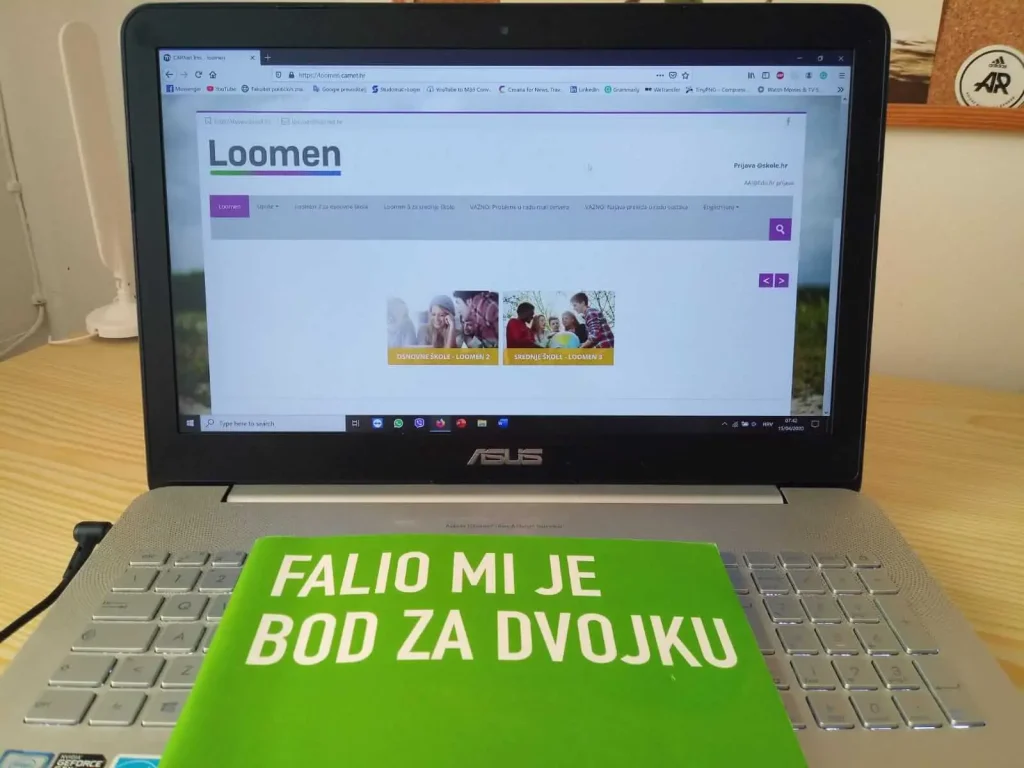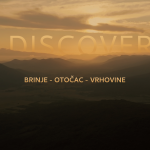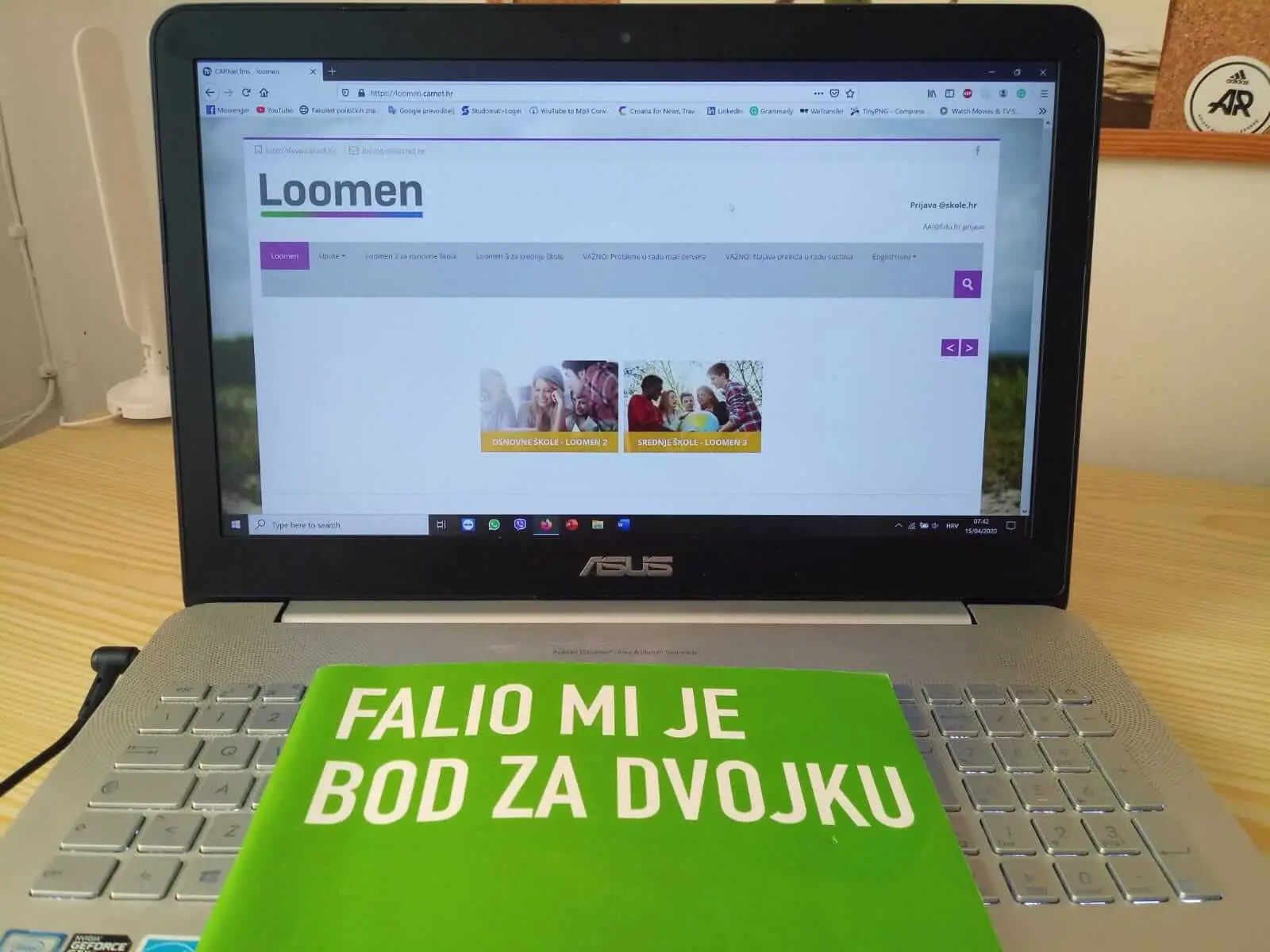
April 15, 2020 – It is almost a month since online schooling became the new education norm in Croatia. TCN intern Janja Sestak talks to five teachers to understand their perspectives.
Students, professors, even parents – all of them are going through something they have never experienced before. While students enjoy waking up a bit later than usual, they struggle with much more work. While teachers get attacked that they are doing less than usual; some of them have spent 10 hours per day in front of their laptops trying to do their best. While some parents are going insane with their children at home, they message teachers, telling them they can’t do the homework because their kid is unbearable.
As I am a student myself, I can say that is true – we do have much more work to do. Then again, we do not go to lectures (and not every single professor holds an online lecture), so I believe we are about the same as before. Most of my professors are doing a fantastic job, and I am grateful for that. Yes, it was a bit confusing at the beginning, but just because it was something new for all of us.
Unfortunately, reading comments on social networks, a lot of people at this time of online schooling, still don’t understand what it is like to be a teacher. There are many of them who did not leave the best impression in our heads of themselves, of course. But in this piece, I want to show you what it is like currently to be a teacher – in primary school, high school, and an assistant on faculty, and how are things handled by the headmaster of a primary school.
I spoke to five people, and one of them wanted to remain anonymous. I will start with that person, and I will call him John.
John is a form teacher in primary school, handling two classes at once because there are not enough children to split the class. Maybe you are asking yourself: “How can someone teach children of the second year while at the same time, in the same classroom, there are children from the fourth grade?”
Well, a lot of things are possible here.
One of the very first things John said to me is that this type of schooling is not the solution. “It seems like we are not doing anything because there are lectures on television. What is worse, lectures on television don’t match the ones where we stopped.”
Teachers who are teaching from first to fourth grade in primary school are not required to hold online lectures. But still, John has made a web page for his pupils and their parents, to make things easier for everybody. He puts all the work material on it, and for now, everything is under control.
My second source is a teacher who also works in primary school, but she teaches the Croatian language to children from fifth to eighth grade. Maja Priher was my teacher, and I chose her for this because I knew she would be honest. I sent her a message saying I’m hoping she is doing fine in these crazy times and whether or not she would be interested in giving me a statement about the online school reality.
I received a message that is a statement in itself: “Hi! Here is total chaos, and I am frustrated with this online school because I spent most of the day in front of my laptop (10+ hours). I barely find time to help my kid with the homework and prepare lunch. And, the spring cleaning is the last thing on my mind. If you don’t have too many questions, send them to me. I will find time for you.”
I know she is dedicated to her job since I was her student, so I know how she gets things done. But this message left me in shock. In further conversation, she said that it is her responsibility, but also a willingness to read and comment on every single homework she gets from her students. Mrs. Priher checks daily if students saw the task and reminds them if they didn’t. “I’m trying to prepare my video lectures, and this requires a lot of time and learning about tools for it.” Again, she is not obligated to do video lectures on her own. She wants to give everything not to hold her students back.
I asked her to send me one photo that would suit best to her profession in these terms. She sent me this, with the caption: “The real situation. And me behind it, wrapped into a blanket because I’m cold from so much sitting.”
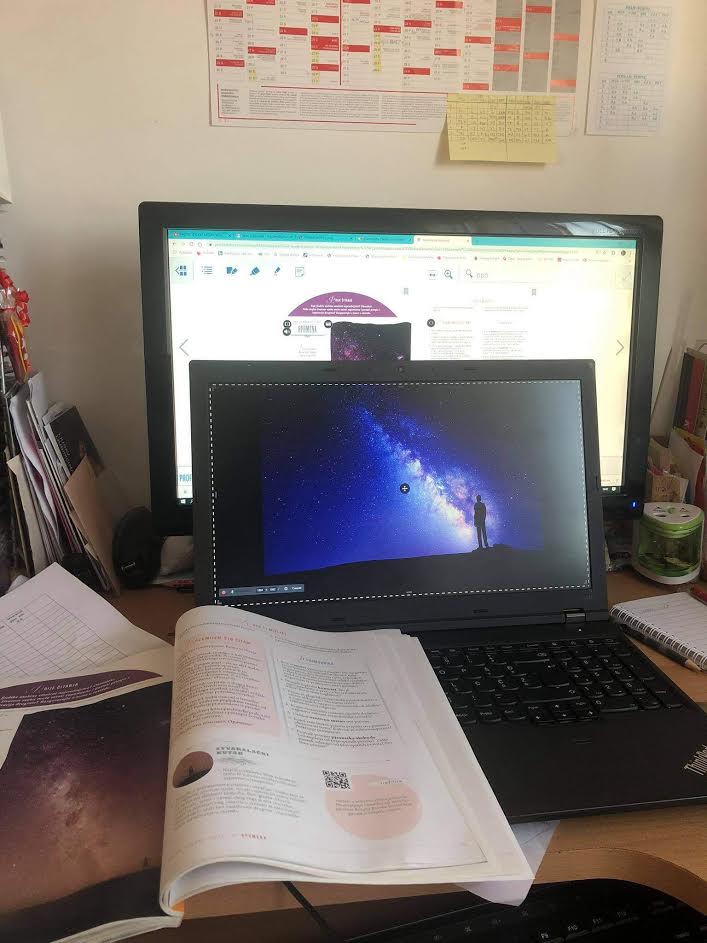
(Photo credit: Maja Priher)
After covering the situation in primary school, let’s move to the high school. My source for high school is Cecilija Nekić, a teacher of Italian and Philosophy.
If we leave behind the occasional network problems, according to professor Nekić, the whole system is functionating very well. Professor Nekić says that the transition to online classes was painless. “Everything was done in one day because of the key people from the school who did a great job. Also, I have to mention helpful the parents, who are being understanding and cooperative.”
But what she misses the most is the inability to communicate directly with students. “The Socratic method, which consists of well-prepared questions by teachers, leading students to a solution, cannot be implemented,” says professor Nekić. Professors tend to send students interactive content, which takes a lot of time. Not only to prepare it but also to find ones that are good enough. Professor Nekić claims that everybody needed some time to get used to the new system, but also, both students and professors understand each other’s position.
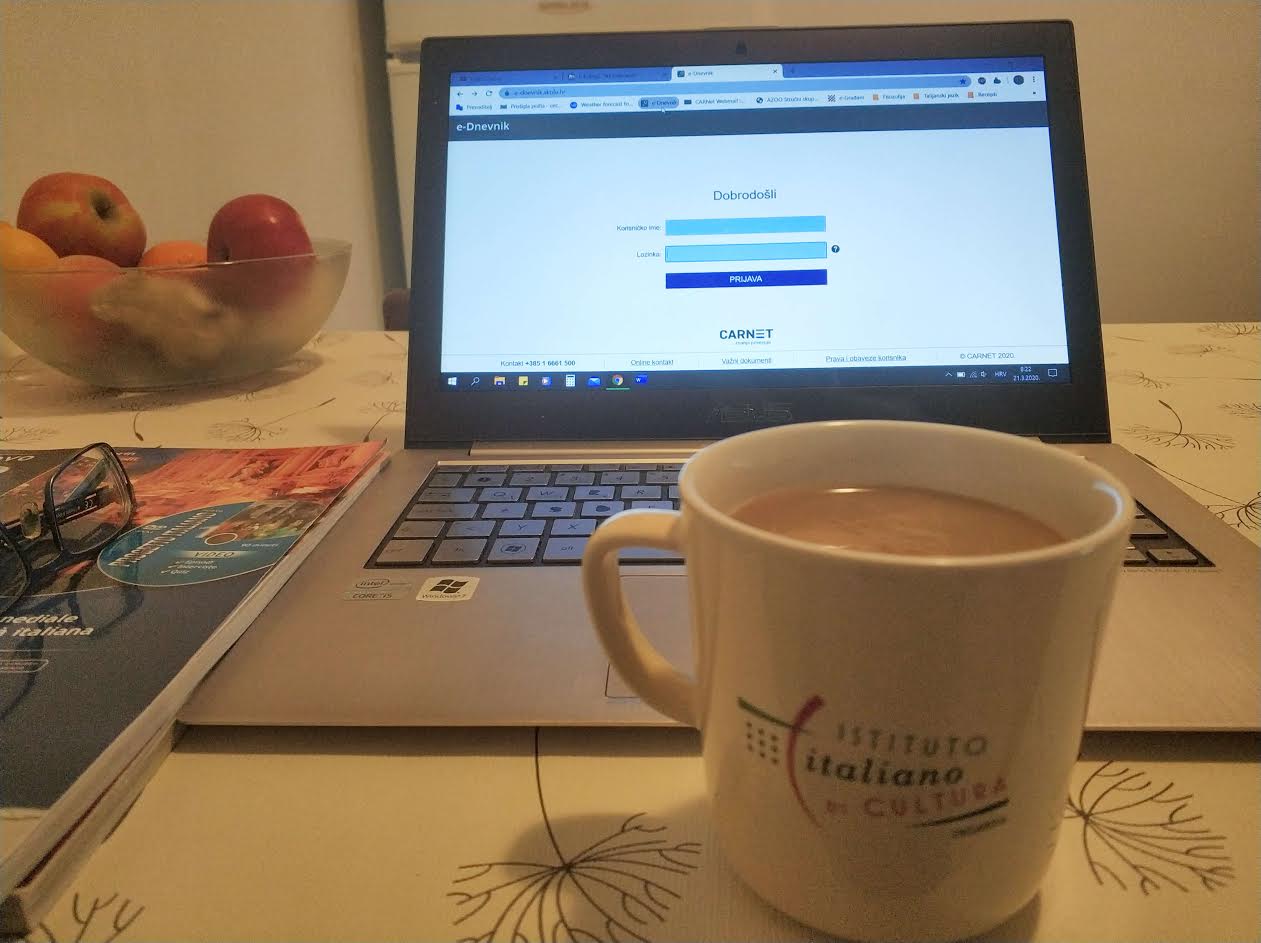
(Photo credit: Cecilija Nekić)
“I often tell my students that the definition of intelligence is the ability to cope with new situations and that this is a real opportunity to practice this premise.”
Professor Nekić holds lectures for 250 students, of which six classes are graduate ones, who are now in the biggest panic. Students who are now at the turning point of life told her that they are scared. They are worried that Matura won’t be held and that their dream of enrolling in their long-wanted faculty won’t happen. They are afraid that they will never return to the classroom with their friends. Professor Nekić tries to calm them down. “I cannot imagine how they feel, but I am always saying to them that we, the teachers, are here for them. I tell them to look at this situation reasonably and rationally, and that it is crucial to maintain a cool head.” Also, she advises them to stay away from fake news and to listen to the Ministry.
When asked whether this situation is a good experience or a necessary evil, she answers with something I want to conclude the story from high school. “By no means do I want to underestimate the seriousness of the situation, quite the contrary. I want to emphasize the importance of caring for mental health and drawing attention to the fact that it is our free decision about how we will cope with the same.”
After high school, let’s see how things look from university. Petra Kovačević is an assistant at the Department of Journalism and Media Production at the Faculty of Political Science at the University of Zagreb and a Ph.D. student at Cardiff University. As one of four lecturers who teaches about Television, she collaborates on courses that are related to the multimedia environment and learning the production of multimedia journalistic forms and exploiting the opportunities of this “virtual” world in the advancement of their journalistic stories.
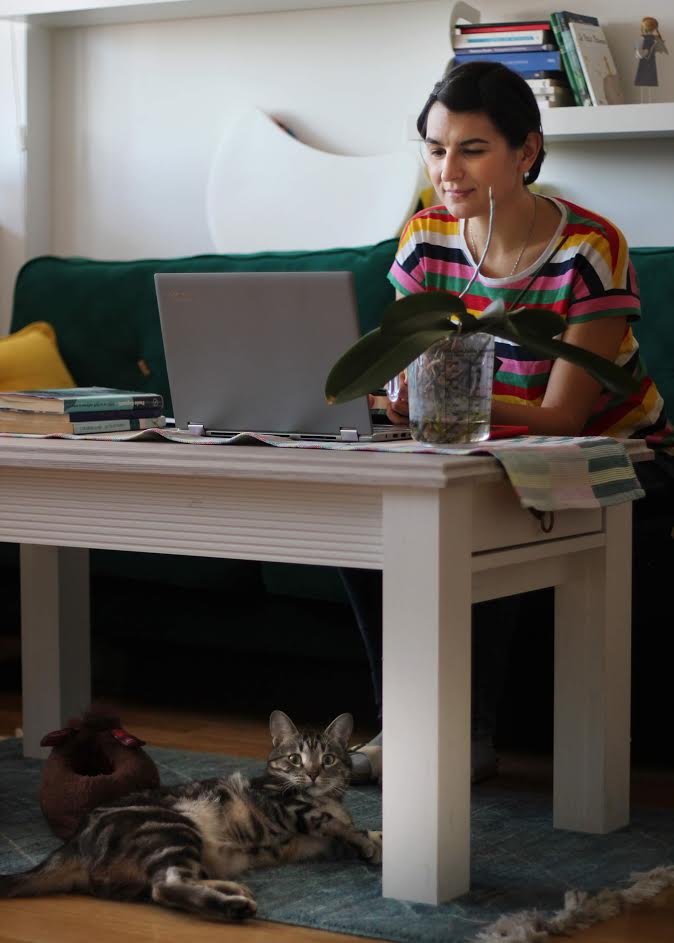
(Photo credit: Petra Kovačević)
She sees this online schooling as a challenge, especially for professors who teach future journalists practical, cognitive, and other skills that are crucial to their profession. “Honestly, this is great for me. I see this as an opportunity for creativity and strengthening one-on-one communication with students.”
Besides regular lectures and seminars, she also holds one-on-one Zoom consultations, trying to be the most helpful to her students.
“We came up with a lot of practical tasks for our students so that they can do them with the knowledge they got on regular lectures. This is the way I learned the most while studying Journalism in Cardiff.”
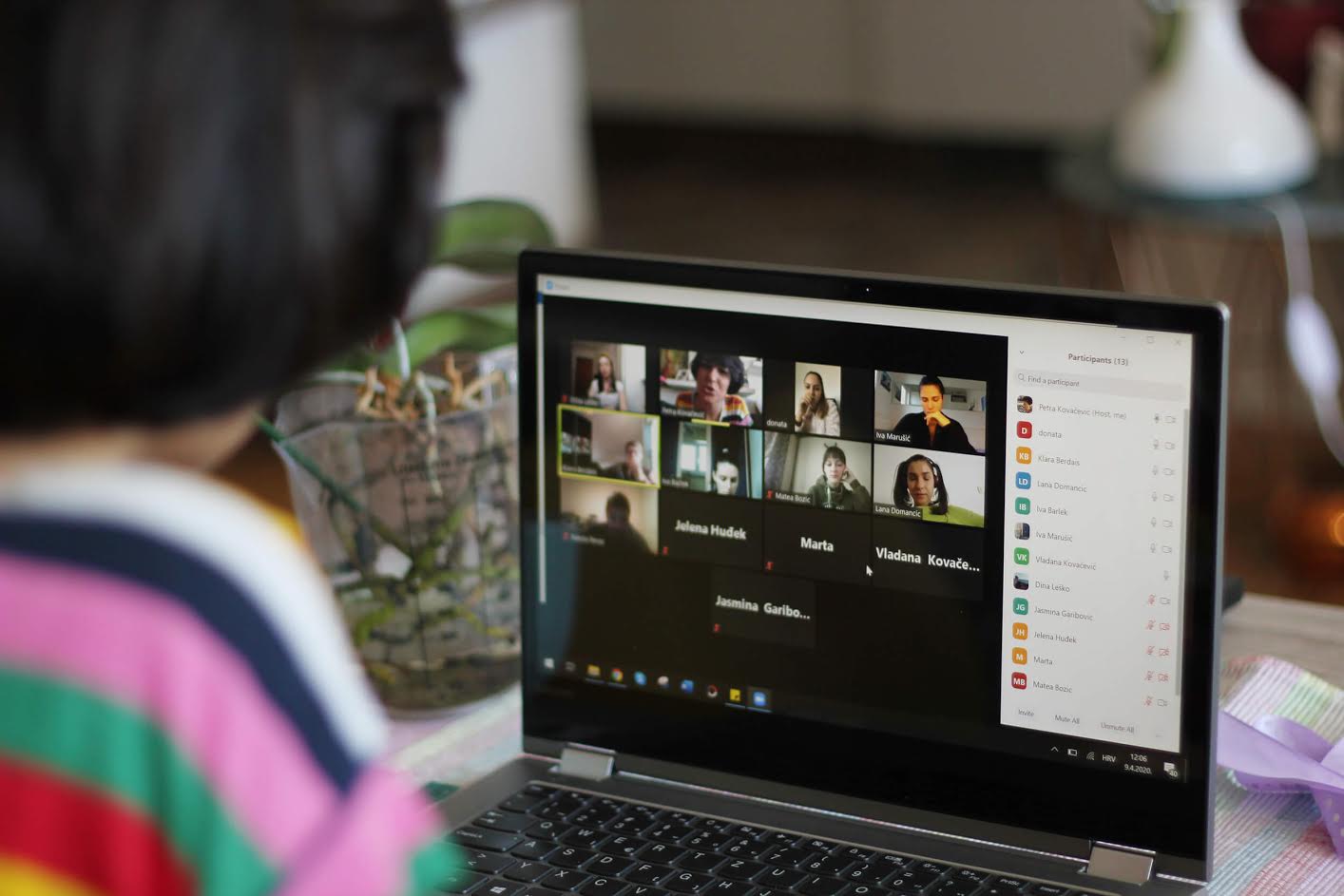
(Photo credit: Petra Kovačević)
Assistant Kovačević believes this is the way students learn the most in a situation like this, but also because students maintain a sense of continuity in fulfilling their obligations. “This means a lot more work for us, professors, but this is fine with me. It is essential that students feel that they are actively traveling towards their destination, that they are concentrated, and less concerned with everything that is happening around us.”
She thinks teachers have more responsibility in this process and that they need to think about what is best for their students first. For her, that means transforming the teaching into new circumstances so that students get the same as they did in classical teaching, and maybe even more. “Changes are sometimes good because they stimulate creativity, both for teachers and students. Personally, the well-being of my students is a priority for me. I am fully committed to the task, and it depends on them how much they are prepared to receive.”
When it comes to the transition to an online system of schooling, assistant Kovačević agrees with professor Nekić. There was no problem when they already communicate a lot with their students via e-mail or social networks. The only new thing was the Zoom. Assistant Kovačević finds both positive and those less positive sides. “The positive is that we can all see and hear, and the less positive is that you can’t ‘feel the vibe’ in the classroom, the rise or fall of energy, which is very important to me in teaching. Some students never turn on the camera or sound, and sometimes it just means a lot to see and exchange a smile or nod, as we usually can live. I think such small things also mean a lot!”
I asked her for an opinion about those who don’t do their obligations. Like students, as do professors. She gave me a humble yet an answer that is worthy of thinking. “Everything a man does; he does to himself.”
Assistant Kovačević doesn’t think this situation puts knowledge and learning on hold. “Still, it does ask us to be flexible – to ourselves, and especially to students, because they are – for me – first and foremost young people and then my students.” Assistant Kovačević sees this as an experience where we all grow together, both professionally and personally.
Lastly, I asked the headmaster of one primary school to share her experience with online schooling. Anđelka Rihatarić explained to me that everything moved online in just one day, as well as that all students and parents were informed about it in a short time. Students from fifth to the eighth year got introduced with MS Team application, the one they use for the virtual classroom, and got their tablets. Thanks to the professor of informatics, Tamara Pofuk, all technical issues were solved.
Lower-grade students watch television classes, which are daily prepared for them by teachers within the School of Life (Škola za život), and their teachers send them additional explanations, materials, assignments, and provide them with feedback on their tasks. This communication goes through the parents – mostly via e-mail or Viber groups. “I have to say that this collaboration is wonderful, quality, cordial both from the teachers and the parents and students. It is a pleasure to watch, and it is, I confess, a spiritual joy how wonderful works, tasks, poems, drawings, recitations are sent by our students.”
One of the questions the most people have is how this online schooling will reflect on children who have just started to learn the basics – read, write, build social intelligence, and more. Headmaster Rihtarić gave a positive yet honest opinion saying that at the level of factual knowledge, not all students may adopt all the outcomes they would have acquired if they were in the classroom and constant interaction with their teachers. “But that human contact, the personal warmth of teachers and students, is also realized through this virtual path. In the next school year, we will all make up for any gaps in knowledge, and this experience is of great interest to us, unexpected – and it is an opportunity for us to learn. To all.”
Headmaster Rihtarić “definitely and nameless” prefers regular school over the online one. “If school were only about transferring knowledge, we wouldn’t even need to be a teacher – Google provides us with all possible information today with just a few clicks … but what is today the greatest wealth of person-to-person teaching and learning is – humanity, warmth, character.”
She continues by saying that this is the reason why schools will never disappear. Today, even under these conditions, distance learning and social self-isolation crystallize that a good teacher is a society’s most significant treasure. One teaches with his two authorities: the authority of knowledge and the authority of humanity. “A teacher teaches with his whole person, with his character, with his smile and voice, with his every action,” the headmaster said.
That is why the teacher should continue to be exemplary because in his hands, parents put their children every day for 6-8 hours, and society for teachers entrusting the shaping of his future.

(Photo credit Anđelka Rihatarić)
For headmaster Rihtarić, this situation is a necessary evil, but as in every crisis, this is also a chance for growth. “Teachers are learning a great deal during this period, and students in this environment of distance learning take far greater responsibility for their own learning, for their own success, for planning their day and learning.”
When it comes to her job, she works longer hours and in a more demanding environment than usual. In addition to all the regular tasks that she performs, such as daily communication with the competent, official correspondence, planning, and communication with teachers and professional assistants, as well as with parents, she is taking care of the necessary maintenance of the school premises. As a principal, she is obligated to monitor and inspect distance learning. “But that laughter, that youth and courage of our students, that persistence and caring of our parents, that dedication and dedication of most of our teachers – all help me to feel only physical fatigue after 10-12 hours of work. Not spiritual.”
If you paid attention, all those people are doing more than is required from them to do; web page, video lectures, friendly advice and support, one-on-one Zoom meetings, and many more. I feel like I shouldn’t say anything more but rather let their words and actions speak for themselves. A lot of things stopped, but education is one of the things that can’t be put on hold.
For the latest TCN coverage on all aspects of the coronavirus crisis in Croatia, follow out dedicated section.

